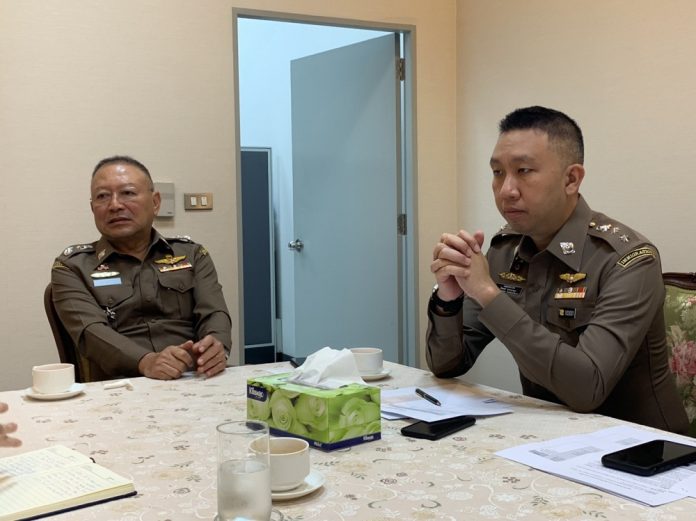Bangkok’s immigration chief is no rookie. He’s been in the service for 35 years, but current immigration protocols have been in place even longer.
“Things were very different back then,” Maj. Gen. Patipat Suban na Ayudhaya said. “First, there weren’t so many foreign residents at the time. So the system we implemented didn’t have this many problems either.”
“When there weren’t many people, it was easy,” he said.
Patipat and his deputy Thatchapong Sarawanangkul spoke in an hour-long interview on Wednesday in response to growing confusion and complaints over the sudden enforcement of decades-old immigration rules. Regulations require expats to report to officials every time they leave the provinces of their registered address for over 24 hours – even for a vacation.

The rules, enshrined in the 1979 immigration law which has not been revised or updated since, were long laxly enforced. Maj. Gen. Patipat said he understands that many are not happy with the law, but the police have no option but to follow it.
“Some of the rules may not be modern, but we are trying to be modern now. We will not always be million-year-old turtles,” Patipat said. “But in terms of the law, we have no power to change it. It’s not under our authority … if you want change, you have to change the law.”
A Faster System
Expats living in Thailand are subject to a dizzying array of regulations. The chief complaints are over TM30 forms, which must be submitted by foreign residents or their Thai landlords to local immigration bureaus every time they leave their residence for 24 hours (and when they return).
The forms must also be submitted alongside passports or ID cards, and either house registration books (in case of houses), or land deeds or proof of sales (in case of condominiums).
Although the form can be completed online, many foreigners complain it takes weeks, or even months, to request a username and password. Patipat said even his son had to wait two weeks when trying to report guests staying in his AirBnb (“He complained about it to me!”).
However, his deputy, superintendent Thatchapong, said a new system was put in place recently, which he claims will reduce waiting times to a week or so.
Thatchapong said the problems arise from missing information. Unlike online visa applications, no “red mark” alerts applicants when they fail to complete certain information or attach required documents. Immigration officials then have to make inquiries for more information.
“Someone even sent us a selfie of himself and his Thai wife, instead of a document,” Thatchapong said.
Both men also insist information filed by foreigners and their landlords is only stored at immigration and not forwarded to any other agency, be it tax auditors or hotel law regulators.
Asked to confirm if, say, unregistered Airbnb hosts could face repercussions after submitting TM30 information, Patipat replied, “Why would we arrest them? It’s not our job. We only want to take care of foreign visitors.”
Targeting Good Guys?
The immigration bureau’s mantra of “good guys in, bad guys out” hasn’t convinced everyone, if reactions from the audience at a recent panel discussion were any indicator (“We were pretty bruised,” Thatchapong said).
Why – a common question from many expats – force “good guys” to abide by a byzantine bureaucracy when the “bad guys” would never bother to file proper TM30 documents?
Patipat conceded that criminal elements like “call center” scammers rarely enter the process at all. But the rules might still force landlords and homeowners to check their residents’ credentials and submit them to the authorities to deter any wrongdoers.
“If everyone follows the rules, it would be hard for them to base their operations in Thailand,” the major general said. “But when the rules are lax, the criminals tell each other.”
Thatchapong also said the measures ensure the authorities know where foreigners are in case of emergency, and alleviate homeowners’ worries about the identities of their guests.
Both men admit the troubles lie in the reporting process.
“I think everyone understands our reasons,” Maj. Gen. Patipat said. “If we make it convenient to obey the law, then everyone will do it.”
Stretched Thin
But the bureau might simply be too overwhelmed to meet the needs of a rapidly expanding expat community and the complexity of modern-day travels.
There are about 5,000 immigration officers around Thailand, who welcome 35 million – and growing – visitors each year.
Roughly only 250 of those officers are staffed at immigration’s Division 1, which oversees the entire expat and tourist population of Bangkok, on top of migrant workers from the Kingdom’s neighboring countries.
Patipat believes there’s a jarring disparity between the government’s priority of bringing in more tourists, and the resources it allots to the people responsible for those visitors. For instance, airport authorities have not expanded the immigration channel at Suvarnabhumi Airport for years, despite a recent boom in arrivals.
“More people are using the airport, but they don’t give us more booths, so of course there are longer lines. And who gets the blame? Immigration,” Patipat said with emotion. He added that the new Suvarnabhumi terminal being built will likely befall similar problems.
“Immigration is always the last thing they think about,” he said. Asked what the government can do to help, Bangkok’s immigration commander said more stable infrastructure is needed for efficient and smooth service.
“That, and some understanding,” Patipat said.




